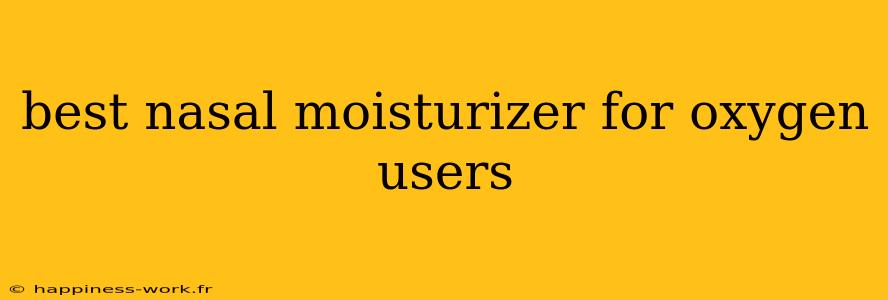If you're an oxygen user, you may often experience nasal dryness and irritation due to the continuous flow of oxygen through your nostrils. This issue can lead to discomfort, nosebleeds, and even sinus infections. Thus, using a nasal moisturizer is essential to maintain nasal health and comfort. In this article, we will explore the best nasal moisturizers for oxygen users, addressing common concerns and providing practical solutions.
Why Nasal Moisturizers are Important for Oxygen Users
The Impact of Oxygen Therapy
Oxygen therapy is a lifesaving treatment for many individuals with respiratory conditions. However, it can lead to dehydration of the mucous membranes in the nasal passages. The dry air can cause symptoms such as:
- Nasal congestion
- Irritation and itching
- Increased risk of infections
- Nosebleeds
Using a nasal moisturizer can help alleviate these symptoms by hydrating the nasal passages and protecting them from irritation.
Top Nasal Moisturizers for Oxygen Users
1. Saline Nasal Sprays
Example: Ocean Saline Nasal Spray
Saline nasal sprays are one of the simplest and most effective solutions for nasal dryness. They work by providing moisture directly to the nasal passages. These sprays typically contain sterile saline (saltwater) which helps in keeping the nasal membranes hydrated.
Pros:
- Quick relief from dryness
- Non-addictive and safe for frequent use
Cons:
- May require multiple applications throughout the day
2. Nasal Gels
Example: AYR Saline Nasal Gel
Nasal gels offer a more sustained level of hydration compared to sprays. They are thicker and tend to last longer in the nasal passages, making them ideal for those who use oxygen continuously.
Pros:
- Long-lasting moisture
- Ideal for nighttime use
Cons:
- May feel sticky initially
3. Humidifiers
While not a nasal moisturizer in the traditional sense, using a humidifier can significantly improve the moisture levels in the air you breathe, indirectly aiding nasal hydration.
Pros:
- Improves overall air quality
- Beneficial for the entire respiratory system
Cons:
- Requires regular cleaning to prevent mold growth
4. Prescription Nasal Moisturizers
In some cases, a healthcare provider may prescribe specific nasal moisturizers that are medicated for additional benefits, such as reducing inflammation.
Pros:
- Targeted treatment for specific conditions
- Often more potent than over-the-counter options
Cons:
- May require a doctor’s visit
Practical Tips for Using Nasal Moisturizers
How to Use Nasal Sprays and Gels Effectively
-
Tilt Your Head: When applying a nasal spray, tilt your head slightly forward. This position allows the spray to reach the upper nasal passages more effectively.
-
Follow Instructions: Always follow the manufacturer's instructions regarding the number of sprays or the amount of gel to use.
-
Maintain Hygiene: Keep the tip of the spray or gel tube clean to avoid introducing bacteria into your nasal passages.
Additional Ways to Maintain Nasal Moisture
- Stay Hydrated: Drinking plenty of water throughout the day will help keep mucous membranes hydrated.
- Limit Caffeine and Alcohol: Both can lead to dehydration and worsen nasal dryness.
- Avoid Irritants: Smoke, strong scents, and air conditioning can exacerbate nasal irritation.
Conclusion
Maintaining nasal moisture is crucial for oxygen users to enhance comfort and prevent complications. The choice between saline sprays, gels, humidifiers, and prescription options depends on individual needs and preferences. Always consult with a healthcare provider if you're uncertain about the best products for your situation.
For ongoing management of your respiratory health, consider integrating these nasal moisturizers into your daily routine. Doing so will help ensure that your nasal passages remain comfortable, hydrated, and healthy.
This article is inspired by content on WikiHow, with contributions from various authors. For further reading, please refer to their detailed guides on nasal care and oxygen therapy management.
